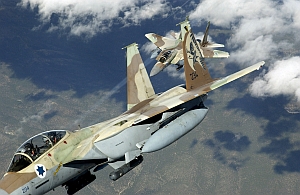When Waging War is Pursuing Peace

 As Pinchas taught us, sometimes an act of violence promotes peace.
As Pinchas taught us, sometimes an act of violence promotes peace.
At the end of last week’s Torah reading, we are told that one of the leaders of the Tribes of Israel engaged in an immoral act, deliberately violating the Commandments. He did it brazenly, “in your face,” challenging Moshe and all of the Children of Israel. Everyone was crying, but Pinchas knew what he had to do: pick up a spear. And how did G-d respond? Per this week’s reading, He bestowed upon Pinchas His Covenant of Peace.
We have no prophets today, but neither are any necessary to understand that there is no evil in killing barbarians bent upon killing you.
To those offended by my use of the term barbarians, I offer no apology. These are not civilized human beings with the same values as you and me. People who target women and children, hospitals and kindergartens, are barbarians. People who loudly proclaim that they “celebrate death,” are barbarians. People who bring their own children into buildings after a phone call from the IDF warning them that the building is about to be destroyed, are barbarians.
It is clear that Israel is making a maximum effort to minimize civilian casualties. When the barbarians have their families gather on top of the roof of the building, the IDF changes its mind and doesn’t destroy it. When the barbarians launch a missile next to a residential or office building, the IDF waits until it can target the precise spot. Multiple times they have targeted the vehicles driven by leaders of Hamas and Islamic Jihad, waiting until no pedestrians were nearby. They have even destroyed entire buildings while barely damaging nearby residences.
So we pray for the safety of the soldiers. We pray for the safety of every civilian, on either side. And when Hamas decides to abandon the path of terrorism and join civilization, no one should try to kill them. But in the meantime, terrorism must be stopped.
As someone put it previously, “if Hamas laid down its weapons, there would be no war; if the IDF laid down its weapons, there would be no Israel.” And in their effort to protect lives, the IDF is going to kill terrorists. There will be “Palestinian casualties,” the majority of whom, according to all accounts, were active terrorists and others warned to leave buildings that served as operations centers or storage locations for missiles, and came inside instead. Sometimes the pursuit of peace requires waging war, and our regret at casualties must be tempered by the knowledge that the IDF is pursuing peace, not war.



and of course we must condemn the evil type of kano’us—the murderers by sreifa of an innocent arab teen -that caused this war….
Let’s be careful. Honestly, I think you have made two errors in a short comment.
First of all, it wasn’t “evil kano’us,” it was evil, period, from shababnik drop-out soccer fans led by someone with serious psychological problems. There is no “type” here to condemn, as there is nothing like this crazed murder which has been condemned from all quarters. To imply that what they did might be attributed to any movement or ideology is unjustified.
And second, the missile fire from Gaza, which precipitated this operation, accelerated as soon as the IDF started searching for the three boys and their murderers. So to attribute this war to the murder is just as unjustified.
This war has stronger justification than hora’at sha’ah by which tradition chose to justify Pinchat’s action. The issue is not simply justification. Golda Meir correctly bemoaned the impact of war and justified killing, even when adhering to the strict ethical guidelines written by Prof. Halbertal and others.
I am somewhat puzzled by your statement that we should “pray for the safety of every civilian on either side”. Now, I agree that we should take every reasonable measure to avoid killing civilians on the side of the enemy, but according to international law, combatant nations are allowed under certain circumstances to carry out attacks EVEN if it leads to enemy casualties.
I am not aware of references in the Torah, TANACH and Talmudic literature which say that we are obliged to pray for our enemies; perhaps I am just not well informed.
To summarize, I understand that we do not revel in killing enemy civilians, but I am not aware that we are supposed to pray for their welfare.
Here is one source, from a footnote to an article in vol. 16 of Hakira, pg. 54 n.29: David Samson, Torat Eretz Yisrael (Jerusalem, 1991), p.86, … quotes R. Tzvi Yehudah Kook as stating in the name of his father that the duty to love all nations also applies to the Arab nations. Even when other nations seek to destroy the Jewish People, it is their evil that should be hated, not the nation and its people.
Some will object that R. Kook’s view may be an isolated, extreme one. Perhaps. What comes to mind is something I heard from Hakira’s editor, R Benzion Buchman, whom I had the pleasure to meet in person at a recent wedding. He recounted a conversation with Daniel Pipes, in which the latter argued that it is not accurate to say that we live in a time in which extreme positions count. Rather, he said, we’ve gotten to a point in which the ONLY positions that count are extreme ones.
If there is any truth to what he says, I would think twice before discounting Rav Kook. The alternative, antipodal position to R Kook is that of one Aharon Teitlebaum. I’ll take Rav Kook.
Completely accurate, Rav Menken in your comment!
lacosta-IMO, your comment is an example of PC moral equivalence. I agree with R Menken-drunken soccer fans are capabale of anything-but I would hestitate before I blamed their actions for formenting an international incident, when all of the evidence points to Hamas as desiring one fact only-the eradication of the State of Israel, by the means of rocket and missile attacks and kidnappings of Israelis which are aided and abetted by the citzens who are far more than human shields-they fully support the actions of Hamas.
What are the halakhic paramaters in dealing with the ‘Palestinians’
(I’m only referring to the majority of West Bank arabs, who are innocent)
in relation to the Scriptures [which say that Hashem gave us this Land]?
Rav Adlerstein-
I am afraid I fail to see the connection between Rav Kook’s statement (and I view myself as a follower of Rav Kook’s teachings) and the claim that we should “pray for the safety of (enemy) civilians”.
The 20th century became the century of “total war”, which means the civilian population is an integral part of a nation’s war machine, thus it has become apparent that weakening the civilian sector contributing to the war effort of a country has to be part of the military efforts of another country at war with it. For instance, an article I read said that HAMAS ordered civilians in the Gaza Strip to allow them to build bunkers for the manufacturing and storing of rockets underneath civilian homes while they are occupied by their owners. Are we to say, given the fact that HAMAS aims indiscriminate rocket fire into Israeli civilian population centers, which is a war crime, that because civilians may be hurt or their property damaged we are not allowed to view that civilians home a legitimate target and that we should pray for that civilian’s welfare even if it directly endangers OUR civilian population?
Although I am not a halachic scholar, I interpret Rav Kook’s admonition to mean that we should treat PEACEFUL Arabs with due respect even if they don’t like us in their hearts, and also that during military operations enemy civilians and prisoners-of-war be treated according to the laws of war (one example is that during the Lebanon II war, Israeli troops quartered themselves temporarily in the homes of Lebanese civilians who had fled. These troops ate food in the house and when they left, they left money behind to cover what they had taken). However, none of this means we have to pray for the welfare of these enemy civilians who welfare may very well be in direct opposition to OUR welfare.
I am aware Avraham Avinu prayed for the welfare of Sedom and Amorah, but he was praying on behalf of the Tzaddikim of those cities, and those cities were NOT in a state of war with Avraham, in fact, Avraham’s nephew Lot lived in Sedom, so again, I don’t see any precedent for praying for the welfare of enemy civilians. Avraham himself even went to war as an ally of Sedom in the war against the four kings, so again we don’t learn anything about praying for the welfare of enemy civilians.
[YA – Not sure that I disagree. My point was only to react against what some readers would interpret as a given: that we don’t daven or care for people who are evil, and we really don’t like. (The Netziv in his famous hakdamah to Bereishis opines that Avrohom hated the evil of the people of Sdom – and still davened for them.) R Kook shows that it is not inconceivable that the Torah would want us to make room for rachmanus even for mortal enemies. It makes perfect sense that we would not daven for those whom we are actively fighting on the battlefield. OTOH, it is also possible that R Kook would urge us to daven that the enemy be vanquished with as little death, injury, pain and suffering as possible. I will defer to those who have a better handle on this aspect of R Kook’s machshavah.]